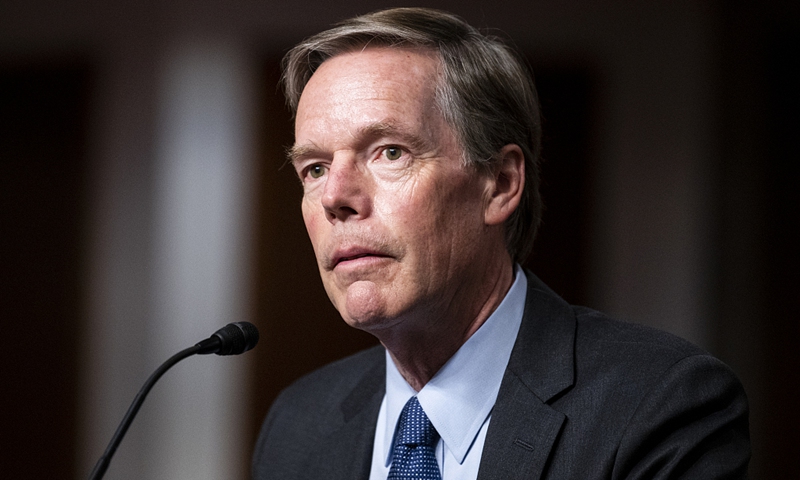
Nicholas Burns Photo: CFP
Career diplomat Nicholas Burns finally won US Senate approval to become the new ambassador to China after the post was left vacant for nearly 14 months. Chinese analysts said that against the backdrop of tense China-US relations, it is hard to expect the new ambassador to push for breakthroughs. They also warned Burns should act dutifully as an ambassador that is supposed to promote bilateral ties instead of trying to play an agent of US Secretary of State Antony Blinken to lecture China on human rights issues or promote US values.
The majority of US senators on Thursday backed the confirmation of President Joe Biden's nomination of Nicholas Burns to be ambassador to China. It was not immediately clear when Burns would head for China, Reuters reported on Thursday.
Burns, 65, is a career diplomat who has served under both Democratic and Republican presidents. He previously served as US ambassador to NATO and Greece. From 2005 to 2008, Burns also served as undersecretary of state for political affairs.
Similar to his predecessors, Burns will fulfill the role of executer of US policy toward China, but given his previous experience as a veteran diplomat and experience of dealing with crises, he may offer "political proposals" but with limited influence, Li Haidong, a professor from the Institute of International Relations of China Foreign Affairs University, told the Global Times.
Li noted that Burns' role as the US ambassador to China remained important especially with China-US relations entering a "big transition period," and an authoritative, effective, swift and direct communication channel through the ambassador could help deal with acute situations. Burns' winning of trust from Biden and other Democrats may also be one of his advantages.
Lü Xiang, director for research of the Chinese Institute of Hong Kong, told the Global Times that Burns has a good resume and has worked in the same circles as Blinken and US National Security Adviser Jake Sullivan for many years. Barring the unexpected, Burns will be a conventional ambassador.
Given the current situation, Blinken has assumed an outsized influence on US security and diplomatic affairs. China may not expect too much from Burns on leading breakthroughs while serving in Beijing. "Burns will only be a loyal lieutenant for Blinken," said Lü.
With low expectations of Burns, Chinese analysts also warned that Burns should act dutifully as an ambassador, and not an agent of Blinken in promoting human rights issues or ideology in China as the latter, together with other officials from the Biden administration, are racking their brains in using ideology and US values and human rights as weapons to compete with China.
They also noted that it is also rare to see a potential ambassador to China hostile toward China even before his nomination was approved.
During a US Senate hearing in October, Burns claimed that China is "the biggest geopolitical test of the 21st century." He also launched a fierce attack against China's domestic and foreign policies, including touching on China's Xinjiang and Hong Kong regions.
Hu Xijin, former editor-in-chief of the Global Times, posted on his Sina Weibo account, "Even after he comes to China, his soul will stay in Washington; Beijing will only see his body. His soul will direct his body to speak and act in Beijing and also show off. He will not become an envoy of China-US friendship."
Hu noted that aside from diplomatic treatment, Chinese society could show their indifference to Burns — for example, not to be eager to invite him for activities as his attendance is not an honor.
The news of Burns' approval in the Senate came three months after he was first nominated by Biden in August, and the wrangling over his nomination had left the US president without an official envoy to Beijing 11 months into his administration.
Reuters also noted that Biden's choice of Burns, who has served under both Democratic and Republican administrations, marked a shift for the role of ambassador to Beijing, a position which recently has been filled by former politicians, not seasoned diplomats.
Lü said that the extended vacancy for the posting to a major country has been rare and not a healthy sign for bilateral relations. The real reason for the delay of Burns' nomination is not opposition from the Senate but rather filibustering from political actors to serve their own interests.
The process also showed that from the Trump administration to the Biden administration, the US domestic political politics has changed little, and it also showcased the low efficiency of the US government and the unstable and unpredictable situation of its domestic political landscape, Lü said.
The position of the US ambassador to China has been vacant for nearly 14 months, which is the longest vacancy in the history of bilateral relations. Former US ambassador to China Terry Edward Branstad left the post in October 2020, with Robert W. Forden serving as the US' Chargé d'affaires to China. In July, Forden left the post before the appointment of a new ambassador.
Burns' pathway to Senate approval was paved with grandstanding by a number of senators. The approval itself only came on Thursday after Senator Marco Rubio lifted his hold on the nomination in exchange for passage of a bill that bans imports from China's Xinjiang region citing "forced labor" concerns.
Li said that the longest vacancy of the US ambassador to China also reflected the stubbornness of die-hard anti-China forces in the US - "all agendas that are against China have been pushed swiftly; while any agenda linked to cooperation with China is a slow and tedious process."
The prolonged nomination process also means that the new ambassador faces an unprecedented task as the confrontation between China and the US is fiercer than any point over the previous decades, and the US domestic political situation will limit Burns' room to deal with problems, Li said.




